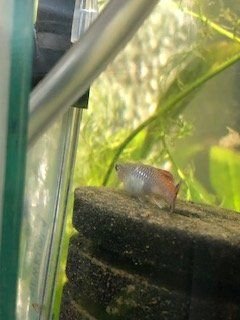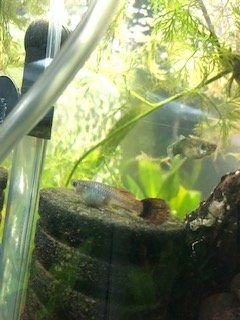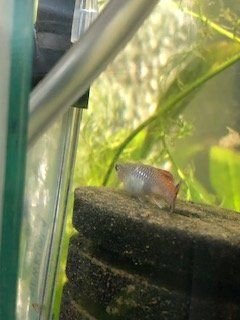The tank has a few snails, 6 corydoras Catfish, and about 15-20 livebearers. Mostly guppies with some only a few months old, 2 female balloon mollies, one platy, and one baby mollie long story. Recently, I got three new female guppies to better my male to female ratio. One of the three named comet has been very lethargic, not interacting with the other fish, barely eating if any, and what made me come here is the clear poop. I don't see the anal worms or an enlarged anus yet if it is parasitic. The other animals all seem happy, but her addition is fairly recent (under a week). I fear it may have already spread, should I med the whole tank if so what meds. I am also considering taking her back to remove what I believe was the original problem. I have no first-hand experience with parasites yet so I am in urgent need of assistance. Thank you.
You are using an out of date browser. It may not display this or other websites correctly.
You should upgrade or use an alternative browser.
You should upgrade or use an alternative browser.
My new guppy is showing signs of illness, urgent.
- Thread starter max22
- Start date
I went through this a couple of weeks ago. I treated the whole tank. I used Prazipro which contains praziquantel. This is probably what you need. I did have to use General Cure afterwards because I was told by another member That one of my fish appeared to have gill flukes. Between the 2 meds, everyone is happy and healthy.
Last edited:
This is why you should always quarantine new fish for at least 2 (preferably 4) weeks before adding them to the main tank. Anyway, that's too little too late so moving on.
Any chance of a picture of the fish?
If the pictures are too big for the website, set the camera's resolution to its lowest setting and take some more. The lower resolution will make the images smaller and they should fit on this website. Check the pictures on your pc and find a couple that are clear and show the problem, and post them here. Make sure you turn the camera's resolution back up after you have taken the pics otherwise all your pictures will be small.
-------------------------
Fish do a stringy white poop for several reasons.
1) Internal Bacterial Infections causes the fish to stop eating, swell up like a balloon, breath heavily at surface or near a filter outlet, do stringy white poop, and die within 24-48 hours of showing these symptoms. This cannot normally be cured because massive internal organ failure has already occurred.
-----
2) Internal Protozoan Infections cause the fish to lose weight rapidly (over a week or two), fish continues to eat and swim around but not as much as normal, does stringy white poop. If not treated the fish dies a week or so after these symptoms appear. Metronidazole normally works well for this.
There is a medication (API General Cure) that contains Praziquantel and Metronidazole and might be worth trying.
It's interesting that API and the Californian government have listed Metronidazole as a carcinogen. That's a concern considering it was widely used to treat intestinal infections in people.
Anyway, handle with care, don't inhale the medication, and wash hands with soapy water after treating the fish or working in the tank.
-----
3) Intestinal Worms like tapeworm and threadworms cause the fish to lose weight, continue eating and swimming normally, do a stringy white poop. Fish can do this for months and not be too badly affected. In some cases, fish with bad worm infestation will actually gain weight and get fat and look like a pregnant guppy. This is due to the huge number of worms inside the fish.
Livebearers like guppies, mollies, swordtails & platies are regularly infected with gill flukes and intestinal worms. If the fish are still eating well, then worms is the most likely cause.
You can use Praziquantel to treat tapeworm and gill flukes. And Levamisole to treat thread/ round worms. If you can't find these medications, look for Flubendazole.
Remove carbon from filters before treatment and increase aeration/ surface turbulence to maximise oxygen levels in the water.
You treat the fish once a week for 4 weeks. The first treatment will kill any worms in the fish. The second, third and forth treatments kill any baby worms that hatch from eggs inside the fish's digestive tract.
You do a 75% water change and complete gravel clean 24-48 hours after treatment. Clean the filter 24 hours after treatment too.
Treat every fish tank in the house at the same time.
Do not use the 2 medications together. If you want to treat both medications in a short space of time, use Praziquantel on day one. Do a 75% water change and gravel clean the substrate on day 2 & 3. Treat the tank with Levamisole on day 4 and do a 75% water change and gravel clean on day 5, 6 & 7 and then start with Praziquantel again on day 8.
The water changes will remove most of the medication so you don't overdose the fish. The gravel cleaning will suck out any worms and eggs that have been expelled by the fish. Repeating the treatment for 3-4 doses at weekly intervals will kill any worms that hatch from eggs. At the end of the treatment you will have healthier fish.
Any chance of a picture of the fish?
If the pictures are too big for the website, set the camera's resolution to its lowest setting and take some more. The lower resolution will make the images smaller and they should fit on this website. Check the pictures on your pc and find a couple that are clear and show the problem, and post them here. Make sure you turn the camera's resolution back up after you have taken the pics otherwise all your pictures will be small.
-------------------------
Fish do a stringy white poop for several reasons.
1) Internal Bacterial Infections causes the fish to stop eating, swell up like a balloon, breath heavily at surface or near a filter outlet, do stringy white poop, and die within 24-48 hours of showing these symptoms. This cannot normally be cured because massive internal organ failure has already occurred.
-----
2) Internal Protozoan Infections cause the fish to lose weight rapidly (over a week or two), fish continues to eat and swim around but not as much as normal, does stringy white poop. If not treated the fish dies a week or so after these symptoms appear. Metronidazole normally works well for this.
There is a medication (API General Cure) that contains Praziquantel and Metronidazole and might be worth trying.
It's interesting that API and the Californian government have listed Metronidazole as a carcinogen. That's a concern considering it was widely used to treat intestinal infections in people.
Anyway, handle with care, don't inhale the medication, and wash hands with soapy water after treating the fish or working in the tank.
-----
3) Intestinal Worms like tapeworm and threadworms cause the fish to lose weight, continue eating and swimming normally, do a stringy white poop. Fish can do this for months and not be too badly affected. In some cases, fish with bad worm infestation will actually gain weight and get fat and look like a pregnant guppy. This is due to the huge number of worms inside the fish.
Livebearers like guppies, mollies, swordtails & platies are regularly infected with gill flukes and intestinal worms. If the fish are still eating well, then worms is the most likely cause.
You can use Praziquantel to treat tapeworm and gill flukes. And Levamisole to treat thread/ round worms. If you can't find these medications, look for Flubendazole.
Remove carbon from filters before treatment and increase aeration/ surface turbulence to maximise oxygen levels in the water.
You treat the fish once a week for 4 weeks. The first treatment will kill any worms in the fish. The second, third and forth treatments kill any baby worms that hatch from eggs inside the fish's digestive tract.
You do a 75% water change and complete gravel clean 24-48 hours after treatment. Clean the filter 24 hours after treatment too.
Treat every fish tank in the house at the same time.
Do not use the 2 medications together. If you want to treat both medications in a short space of time, use Praziquantel on day one. Do a 75% water change and gravel clean the substrate on day 2 & 3. Treat the tank with Levamisole on day 4 and do a 75% water change and gravel clean on day 5, 6 & 7 and then start with Praziquantel again on day 8.
The water changes will remove most of the medication so you don't overdose the fish. The gravel cleaning will suck out any worms and eggs that have been expelled by the fish. Repeating the treatment for 3-4 doses at weekly intervals will kill any worms that hatch from eggs. At the end of the treatment you will have healthier fish.
RedEmpressCichlid
New Member
- Joined
- Oct 4, 2019
- Messages
- 3
- Reaction score
- 0
For any fungal problem use pimafix I use it on my 55g
Note: Never use this on a betta or any labyrinth fish.For any fungal problem use pimafix I use it on my 55g
This is why you should always quarantine new fish for at least 2 (preferably 4) weeks before adding them to the main tank. Anyway, that's too little too late so moving on.
Any chance of a picture of the fish?
If the pictures are too big for the website, set the camera's resolution to its lowest setting and take some more. The lower resolution will make the images smaller and they should fit on this website. Check the pictures on your pc and find a couple that are clear and show the problem, and post them here. Make sure you turn the camera's resolution back up after you have taken the pics otherwise all your pictures will be small.
-------------------------
Fish do a stringy white poop for several reasons.
1) Internal Bacterial Infections causes the fish to stop eating, swell up like a balloon, breath heavily at surface or near a filter outlet, do stringy white poop, and die within 24-48 hours of showing these symptoms. This cannot normally be cured because massive internal organ failure has already occurred.
-----
2) Internal Protozoan Infections cause the fish to lose weight rapidly (over a week or two), fish continues to eat and swim around but not as much as normal, does stringy white poop. If not treated the fish dies a week or so after these symptoms appear. Metronidazole normally works well for this.
There is a medication (API General Cure) that contains Praziquantel and Metronidazole and might be worth trying.
It's interesting that API and the Californian government have listed Metronidazole as a carcinogen. That's a concern considering it was widely used to treat intestinal infections in people.
Anyway, handle with care, don't inhale the medication, and wash hands with soapy water after treating the fish or working in the tank.
-----
3) Intestinal Worms like tapeworm and threadworms cause the fish to lose weight, continue eating and swimming normally, do a stringy white poop. Fish can do this for months and not be too badly affected. In some cases, fish with bad worm infestation will actually gain weight and get fat and look like a pregnant guppy. This is due to the huge number of worms inside the fish.
Livebearers like guppies, mollies, swordtails & platies are regularly infected with gill flukes and intestinal worms. If the fish are still eating well, then worms is the most likely cause.
You can use Praziquantel to treat tapeworm and gill flukes. And Levamisole to treat thread/ round worms. If you can't find these medications, look for Flubendazole.
Remove carbon from filters before treatment and increase aeration/ surface turbulence to maximise oxygen levels in the water.
You treat the fish once a week for 4 weeks. The first treatment will kill any worms in the fish. The second, third and forth treatments kill any baby worms that hatch from eggs inside the fish's digestive tract.
You do a 75% water change and complete gravel clean 24-48 hours after treatment. Clean the filter 24 hours after treatment too.
Treat every fish tank in the house at the same time.
Do not use the 2 medications together. If you want to treat both medications in a short space of time, use Praziquantel on day one. Do a 75% water change and gravel clean the substrate on day 2 & 3. Treat the tank with Levamisole on day 4 and do a 75% water change and gravel clean on day 5, 6 & 7 and then start with Praziquantel again on day 8.
The water changes will remove most of the medication so you don't overdose the fish. The gravel cleaning will suck out any worms and eggs that have been expelled by the fish. Repeating the treatment for 3-4 doses at weekly intervals will kill any worms that hatch from eggs. At the end of the treatment you will have healthier fish.
I have attached pictures to this reply.
Thank you so much for this detailed reply. I med the tank with API general cure, aproximatly 42 hours ago. Things are only worse she now lays on top of the sponge filter and has left the position maybe once or twice since I checked back on her. Another one of the new guppie females was also showing basic signs of ailment with withered down tail and a slight loss of color, and staying near the filter as well it seems to be the early stages of the same problem but no clear poop yet. I have ruled out wasting disease and gill/skin flukes.
I also fear for the 6 corydoras and snails that I have in concern of meds in the tank. They were all seeming very healthy I have had them for a few months.
Which one of the methods you mentioned do you all recommend that I try next based on the images? Thank you.
Appologize for the late responce I will be at home all day today so I will respond quickly all of you help is very appreciated.
Attachments
Have you completed the General Cure treatment? If so, it may be a bacterial infection in which API Furan-2 is a good Prime duct to use.
Have you completed the General Cure treatment? If so, it may be a bacterial infection in which API Furan-2 is a good product to use.
Last edited:
Similar threads
- Replies
- 1
- Views
- 391




